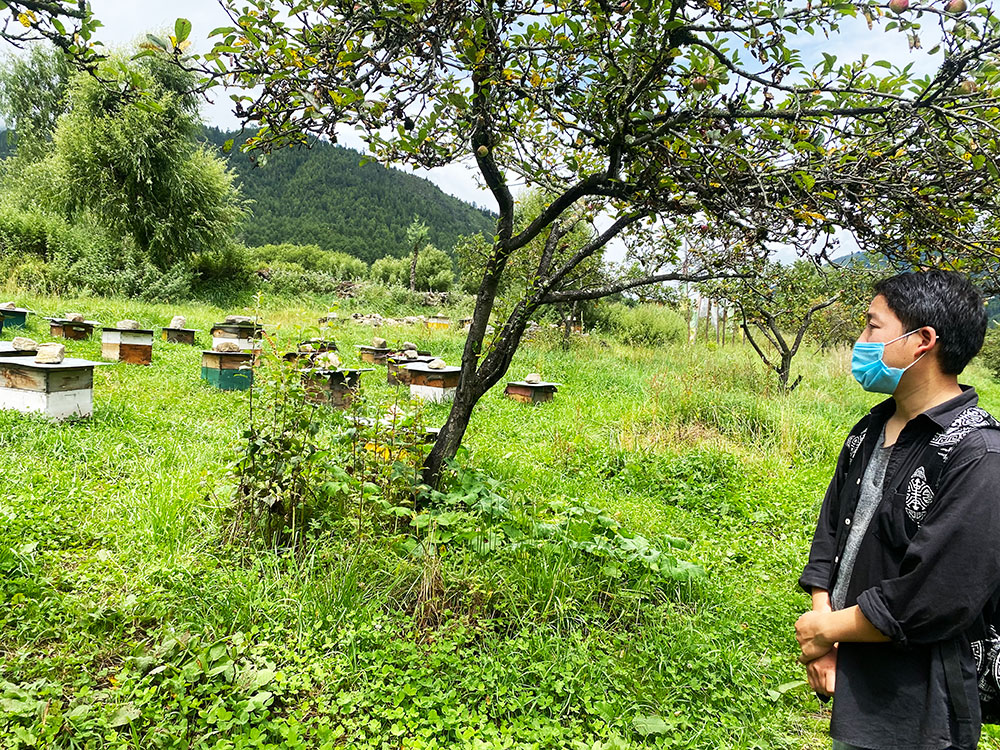Phub Dem | Paro
Growing up with his father, who is an apiarist involved in introducing beekeeping in Bhutan, Leela Raj Pulami from Tsirang was interested in beekeeping from an early age.
Before completing his Masters in Business Administration, he had a business proposal to start a modern beekeeping business in Haa ready.
He picked up 84 queen bees from Bumthang three years ago and established the farm in Namchu under Katsho gewog, leasing 70 decimals apple orchards. He pays Nu 12,500 a month.
The bee-keeping farm has about 90 bee colonies today. Each colony produces around 20 kilogrammes of honey.
Leela Raj Pulami earns Nu 1.2M annually by harvesting two metric tonnes of honey, which is harvested once a year, towards mid July. He sells a bottle of honey for Nu 350 and it often cost Nu 500 in the market.
He targets to have 500 bee colonies. Currently, he is multiplying colonies by breeding and grafting queen bees. He has added 33 new colonies so far.
Marketing his honey to Thimphu and Paro, he said he did not face market problem. “Sometimes we run out of stock and are not able to meet the demands from the local market.”
Honey from high altitudes is considered pure and has medicinal values as bees feed on high altitude herbs and flowers.
While there is potential to export the product, he said it was challenging to meet the local demands. “If I reach my target of 500 colonies, I might explore exporting them.”
He said that foreigners usually place their orders via email, but it was difficult to export a few cartoons considering high shipping charges and taxes.
Meanwhile, Leela is worried about organic production of honey.
He said there was no organic honey production in the country for now. “Organic beekeeping is not possible unless the whole village becomes organic as bees feed on chemical sprayed crops.”
As Haa remains cold for a more extended season, the beekeeper said he ran short of stock by November.
His final task for the year is ‘overwintering feeding’ with sugar syrups in October to brave the cold deserted winter. “We do not have to touch or look after them for five months.”
He said beekeeping is one of the easiest businesses one can do, along with farming. “There is little work, but the return is amazing.”
The honey production, he said, depends on the weather pattern, adding that heavy rainfall shreds flowers, leaving less nectar for bees. “The success of beekeeping would solely depend on weather, rainfall and flowers.”
Domesticated honeybees and agriculture have been linked to each other for many years. Locals said that those orchards residing near the bee farm bear good fruits.
According to the Haa dzongkhag livestock production officer, Kipchu, the lone private beekeeper had encouraged locals to take up the practice, adding that two youth are provided with five beehives and colonies each and was attached with him to learn the process.
He said that the dzongkhag livestock office had been encouraging locals to take up the practice, but due to religious sentiments, it was difficult. “However, many unemployed youths are interested in beekeeping and we expect many to come forward. We have plans to make a beekeeping cooperative in Haa.”
He also said that Leela Raj Pulami and his father, who has 22 years of experience in beekeeping, could be of immense help for locals to take up the practice.
The Department of Livestock launched the National Apiculture Strategy and Action Plan to enhance apiculture development last year.
The action plan highlights the critical issues and provides a practical approach to optimise the sustainable utilisation of the rich diversity of honeybee resources for the benefit of the people.
It states that the beekeeping industry in Bhutan has enormous potential for large-scale production due to the presence of indigenous species of bees and diverse nectar-rich vegetation in its most pristine natural environment.
Recognising the importance of beekeeping, the apiculture programme is included in the 12th Plan. The National Highland Research and Development Centre in Bumthang is mandated to coordinate and implement the National Apiculture Program (NAP).
Edited by Tashi Dema


